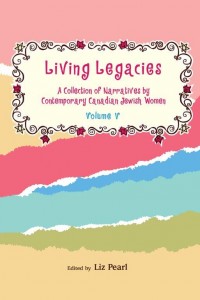The 23 authors in editor Liz Pearl’s latest collection of essays – Living Legacies: A Collection of Narratives by Contemporary Canadian Jewish Women, Vol. 5 (PK Press, 2015) – come from a range of backgrounds. They work in fields as varied as medicine, education, the arts, philanthropy, event planning and graphic design. They have served in the army, immigrated from Africa and led all manner of enterprises in business, education and community service. Their essays are brimful of passion, wisdom and intellect.
Among the writers are Victoria’s Vicki Davidoff and Vancouver’s Ada Glustein.
In her essay, Davidoff describes her journey from good friend and wife to skilled caregiver and, finally, “death doula” for terminal cancer patients. Losing her own husband, Ken, to cancer in 2008, Davidoff learned what it means to create a “conscious death.” Together, she and her husband crafted a space for reflection, writing letters to family members as well as his obituary. She describes this space as “sacred,” and she has established a respectful, spiritual program for patients and their families, one that gives structure and meaning to an otherwise terrifying ordeal.
Glustein, the daughter of Russian immigrants, was raised in a kosher home where Yiddish was spoken and the festivals of Canadian society ignored. Defining herself through her religion and culture, she was presented with a challenge growing up. Every young adult longs to blend in with her peers, but this felt impossible. She once made an Easter card at school. Knowing that it could not go home with her, the teacher tore it up, “her best artwork ever tossed in the wastebasket.” It was like an act of violence; combined with the hurtful comments from well-meaning but ignorant peers, Glustein felt like an impostor.
 Times have changed, she notes. Nowadays, we understand that a person’s culture is less like a cold, unchanging monolith than a soft, woven, multi-textured fabric. Coming to understand and respect her parents’ reasons for raising her as they did, Glustein’s values as a teacher and a mother are grounded in the principle of inclusion.
Times have changed, she notes. Nowadays, we understand that a person’s culture is less like a cold, unchanging monolith than a soft, woven, multi-textured fabric. Coming to understand and respect her parents’ reasons for raising her as they did, Glustein’s values as a teacher and a mother are grounded in the principle of inclusion.
The desire to connect with family is a thread that runs throughout Living Legacies, but the narratives also capture the essence of an organic form of Judaism, in which we all play a role in nurturing bonds both within and beyond our nuclear families. Rituals and traditions are opportunities to slow down long enough to celebrate each other, such as Ruth Ladovsky’s mother exclaiming over the Shabbat dinner table, “Did I ever tell you how lucky I am?”
When Marlene Levenson’s mother was afflicted with early onset Alzheimer’s, which created a sense of “chaos and confusion” in her childhood home, Levenson transformed her anger and grief with chesed, deciding to serve the Alzheimer’s community as a volunteer. Writes Levenson, “I have fallen in love with each and every client…. Being able to give back love and caring to these people is a dream.”
The collection also celebrates the making and eating of food shared with friends and family – blintzes, egg noodles, latkes, the knishes and shtrudel made by Dorothy Rusoff’s mother. Rusoff’s prose is positively delicious, jam-packed with references to cookies, soups, meringues and pastries. The vivid description of her mother and aunt cooking together is served with humor and affection, as well as reverence.
Living Legacies reveals the constant search for growth and inspiration, as modeled by Jewish women who, like Lori Palatnik, observe that “tikkun olam is in our DNA.” These vibrant, dynamic and driven individuals have clear goals for their and their families’ spiritual development. There emanates from this collection the sense of an assembly of leaders.
The stories are entertaining, like the story of the apple pie contest reported by Linda Rosenbaum, as well as challenging and uplifting, like L. Deborah Sword’s account of her unplanned pregnancy. It’s a book best served in small dishes, with lots of room between courses to allow for contemplation.
As is evident from the biographies of these well-traveled writers, many of us are separated from our extended families. Many of us keep a close watch on the clock at certain times of the day, only reaching for the phone when our loved ones in other countries have woken up. Living Legacies is a lovely way to bring the voices of mothers, grandmothers, aunts and sisters into our minds as we sip our coffee and wait for the golden moment when we can call home and hear our own mothers’ voices.
Brenda Morgenstern’s reflection on her mother’s legacy sums up the collection perfectly: “My mother left me with pride. My mother left me with love for Friday nights, Shabbos. Long tables at Rosh Hashanah and Passover. Tables filled with her legacy, her many children and grandchildren, sharing what was most important to her. Each other.”
Like the communal ring described by Rhonda Spivak, the collection is a symbol of the “core values of which Judaism is based – strength of community, love, family and tradition.”
Living Legacies is available from PK Press.
Shula Klinger is an author, illustrator and journalist living in North Vancouver.
